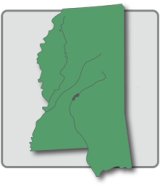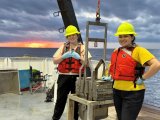EPA Research in Mississippi

EPA researchers are working hard to protect communities across the nation. Learn about some of the work EPA researchers are doing in Mississippi.
- A Journey Aboard EPA & University of Southern Mississippi’s STEM Marine Science Cruise
- Air Quality Modeling in the Mississippi River Basin
- Response to Ricin Contamination
For more EPA work, see EPA in Mississippi.
A Journey Aboard EPA & University of Southern Mississippi’s STEM Marine Science Cruise

In 2024, EPA researchers guided students from the University of Southern Mississippi on a week-long science cruise that delved into the realm of field techniques, marine biology, and applied science. This immersive experience takes students onto a ship, where they live, work, and learn alongside EPA scientists from a range of disciplines. Curious about what a week aboard the Marine Science Cruise looks like? Read Exploring the Depths: A Journey aboard EPA & University of Southern Mississippi’s STEM Marine Science Cruise.
Air Quality Modeling in the Mississippi River Basin Using CMAQ
The Community Multiscale Air Quality (CMAQ) modeling system is EPA’s premier tool for studying air pollution from global to local scales. CMAQ has been used to explore nitrogen loading throughout the Mississippi River Basin to illustrate how the exchange of pollutants through air, water, and soil can disrupt the services provided to people by nature. Read CMAQ: Demonstrating Skill Across Media and Around the World
Response to Ricin Contamination
Ricin is a deadly biological toxin that is easily produced from castor beans, making it one of the most worrisome biological threat agents. In response to an increase in ricin incidents occurring between 2013-2019, including an incident in Mississippi, EPA researchers in the Office of Research and Development developed innovative solutions that led to significantly shortened response times and decreased costs and resources required for ricin incidents. This work provided the federal government with important new capabilities for helping states and local communities respond to ricin incidents.
